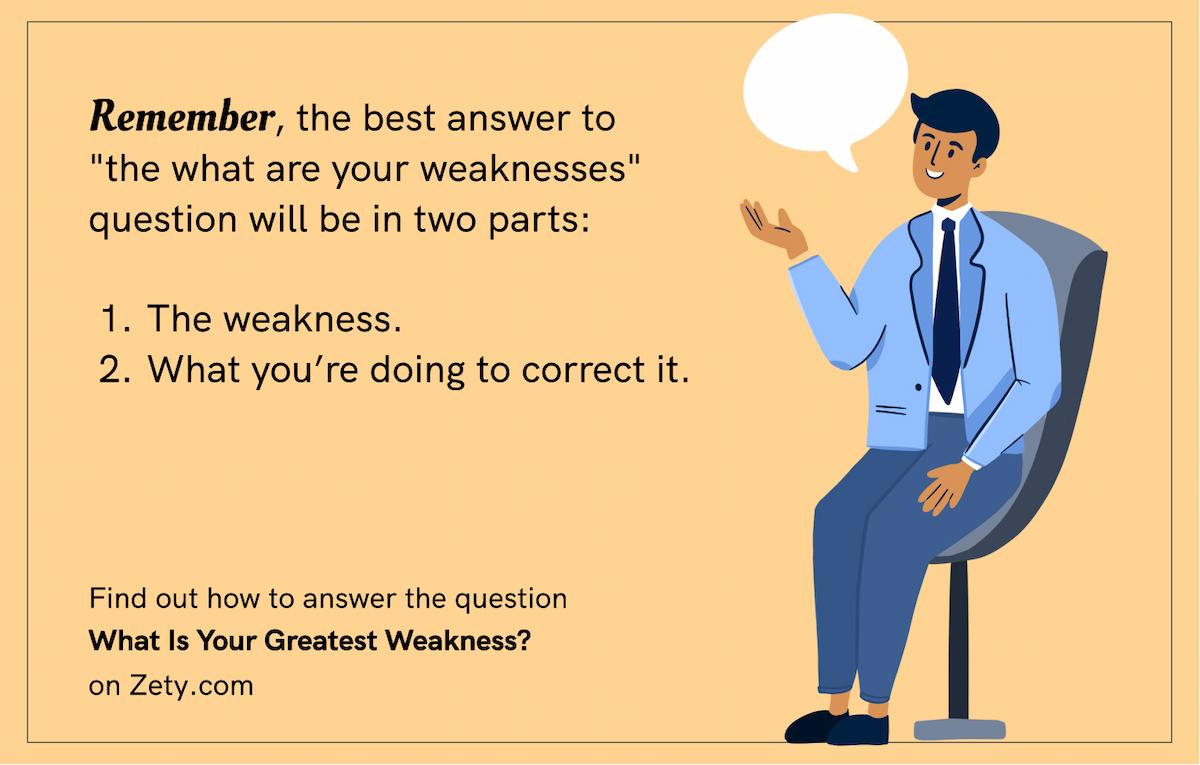Answers to weaknesses in an interview – In the competitive world of job interviews, acknowledging and addressing weaknesses can make or break your chances. Let’s dive into the art of owning your flaws and turning them into opportunities for growth.
Of course, it’s just as important to be ready to talk about your weaknesses in an interview. But when it comes to playing up your strengths, you’ve got to bring your A-game. Check out this article for some tips on how to answer the question “What is your greatest strength?” and make a lasting impression on your interviewer.
It’s like having a cheat code for the interview process! So, go forth and slay that interview, my friend.
Weakness Acknowledgement

Acknowledging weaknesses in an interview demonstrates self-awareness and a willingness to improve. Be honest about your weaknesses, but frame them positively. For example, instead of saying “I’m not good at public speaking,” say “I’m working on developing my public speaking skills.”
To ace an interview, you’ve gotta be ready to dish on your weaknesses. But don’t sweat it! Just like in an interview with Shakespeare , turn those flaws into strengths. It’s all about framing, baby. Just remember, the interviewer’s not looking for perfection, they’re looking for someone who can own their flaws and grow from them.
Weakness Examples: Answers To Weaknesses In An Interview
- Technical Skills:Lack of experience with specific software or technologies.
- Soft Skills:Limited experience in leadership or teamwork.
- Personal Attributes:Perfectionism or difficulty delegating.
Weakness Preparation
Prepare for weakness questions by identifying your weaknesses and developing responses that highlight your strengths. Use the STAR method (Situation, Task, Action, Result) to provide concrete examples of how you’ve overcome weaknesses.
Nailing the answers to your weaknesses in an interview is crucial. It’s like the final boss battle in a video game. After you’ve navigated through the levels of the interviewing process , you’ve got to finish strong with a killer response that shows you’re self-aware and ready to improve.
It’s the cherry on top of your interview sundae, leaving a lasting impression that can land you the job.
Weakness Justification
Explain your weaknesses by providing specific examples. Use the STAR method to demonstrate how you’ve learned from your mistakes and improved your skills.
Nailing the answers to your weaknesses in an interview can be a game-changer. But let’s get real, sometimes it feels like you’re interviewing your insides! If you’re struggling to articulate your flaws, check out an interview with your insides aarp . It’s like a therapist for your interview prep, helping you dig deep and find those answers that will make you stand out.
Weakness Mitigation
Artikel steps you’re taking to mitigate your weaknesses. Explain how you’re developing new skills or seeking professional development opportunities.
Weakness Reframing
Reframe weaknesses as strengths by identifying the positive aspects of your weaknesses. For example, perfectionism can be reframed as a commitment to excellence.
Weakness Avoidance
Avoidance of weakness-related questions can raise red flags. Prepare for these questions and answer them with honesty and professionalism.
Outcome Summary
Remember, vulnerability and authenticity are your allies in the interview room. By embracing your weaknesses, preparing thoughtful responses, and reframing them as strengths, you’ll not only overcome objections but also showcase your resilience and self-awareness.
Quick FAQs
Q: Why is it important to acknowledge weaknesses in an interview?
A: Acknowledging weaknesses demonstrates self-awareness, honesty, and a willingness to improve.
Q: How can I effectively acknowledge weaknesses without sounding negative?
A: Focus on areas where you’re actively working on improvement, and emphasize how these weaknesses can contribute to your growth.
Q: Can I simply avoid questions about weaknesses?
A: Avoiding weakness-related questions can raise red flags and make you appear unprepared or dishonest.
Nailed that interview? If you’re still worried about how you answered that weakness question, check out an ten nae interview for some tips. You’ll be glad you did, because weaknesses are just opportunities to showcase your growth potential. So, go ahead, shine bright like a diamond!
When you’re interviewing for a new job, you’re bound to be asked about your weaknesses. It’s a tough question, but it’s one that you need to be prepared for. One way to do that is to check out an interview with Travis Binns . Travis is a career coach who has helped countless people land their dream jobs.
In the interview, he shares his tips for answering the “What are your weaknesses?” question in a way that will make you stand out from the competition. So if you’re looking for some help with your job search, be sure to check out Travis’s interview.
Ace your next job interview by crafting thoughtful answers to questions about your weaknesses. Take inspiration from Nelson Mandela’s wisdom in an interview with Nelson Mandela . His resilience and unwavering determination prove that weaknesses can be stepping stones to greatness.
Use this insight to frame your responses and demonstrate how you’ve turned perceived shortcomings into strengths.